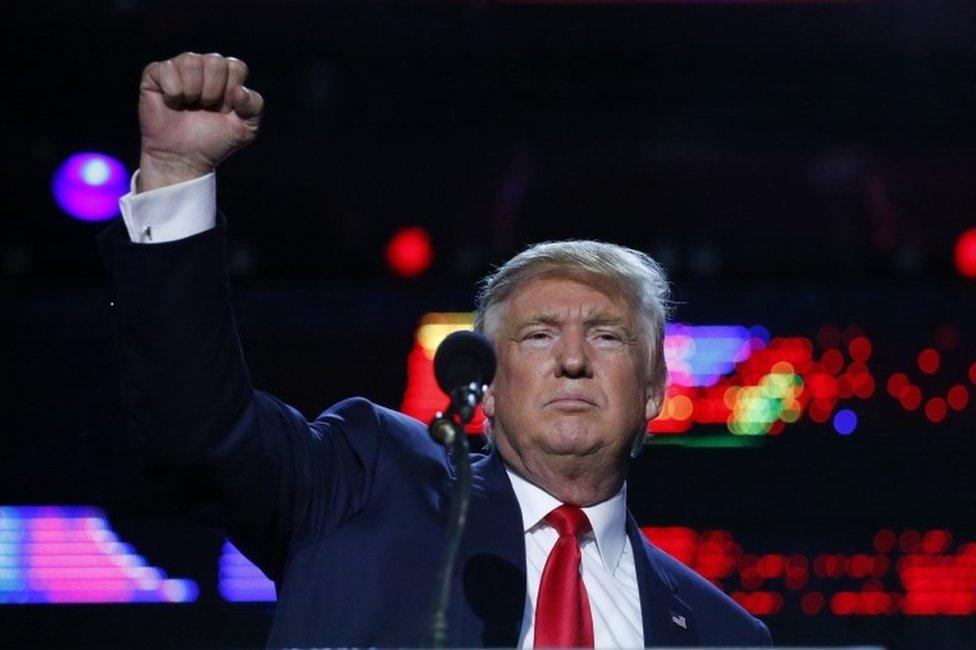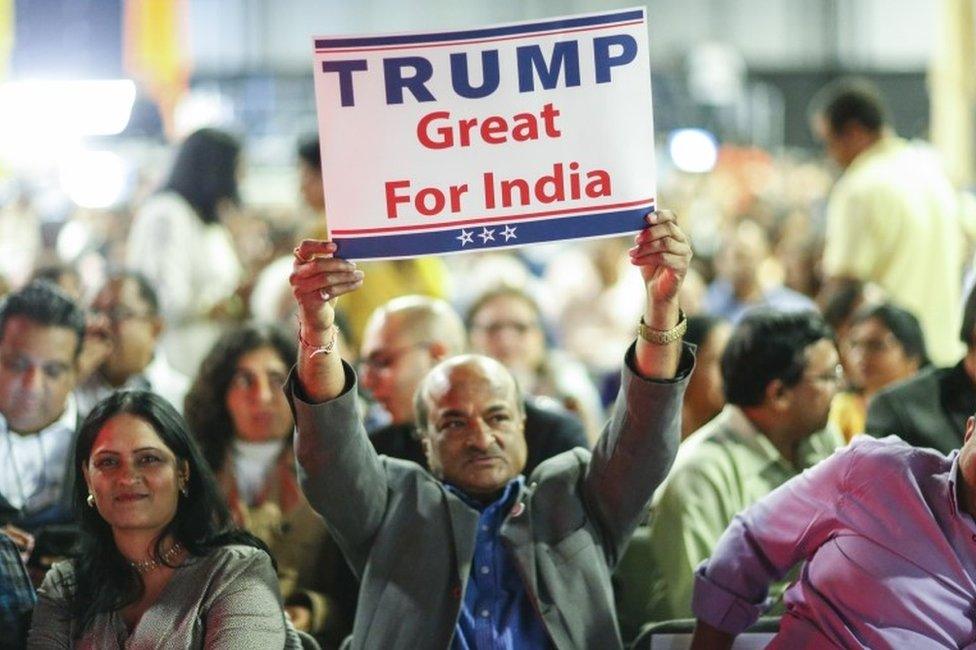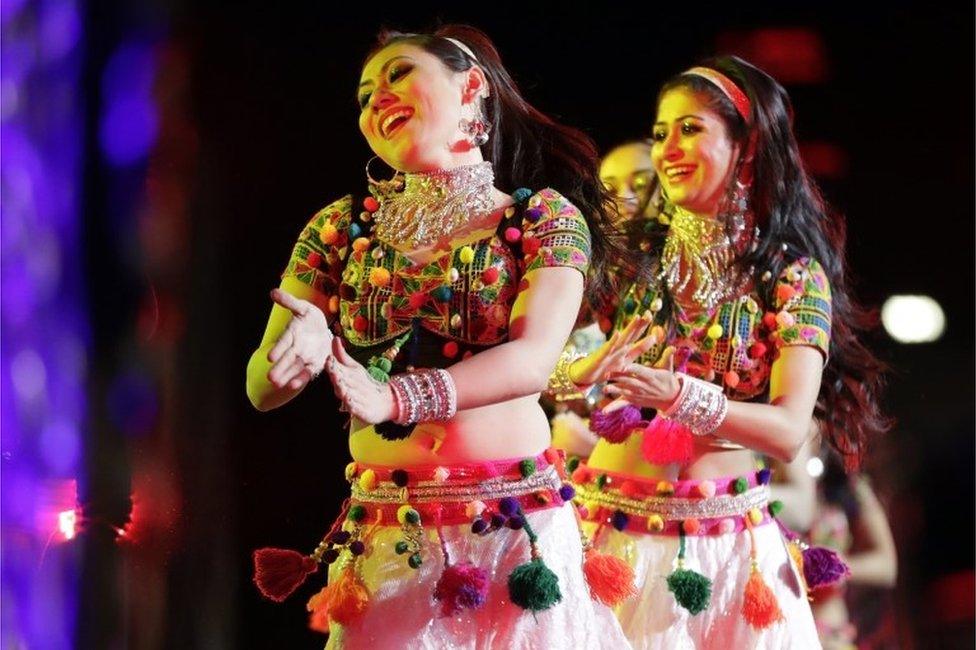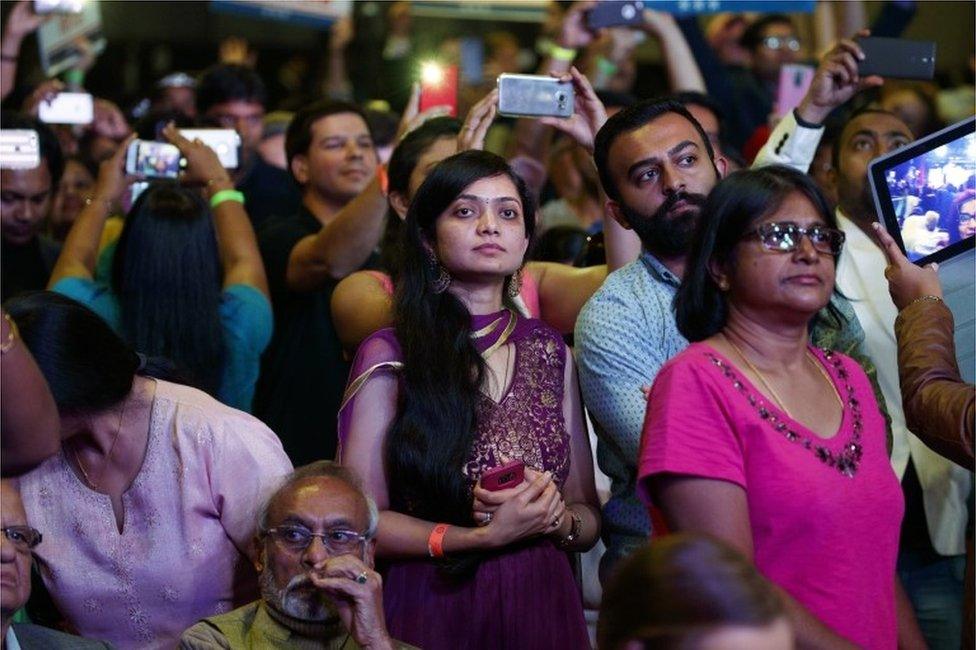US election: Will Donald Trump's outreach to Hindus work?
- Published

Mr Trump used the word "Hindu" as a synonym for India
US Republican presidential nominee Donald Trump attended a glitzy rally of Hindu-American supporters in New Jersey complete with Bollywood celebrities and catchy music over the weekend. Seema Sirohi in Washington writes on whether this will fetch electoral dividends for Mr Trump.
An estimated 5,000 people gathered in Edison, New Jersey, on Saturday for what was billed as a "charity event" to raise money for the victims of terrorism in India and Bangladesh.
Mr Trump made an appearance in between Punjabi singers and Bollywood dancers to declare that India and the United States would be "best friends" if he were elected.
In keeping with the tradition of coming unprepared for events, he showed predictable unfamiliarity with India and made equally predictable mistakes.
'Big fan'
He used the word "Hindu" as a synonym for India, the country. "I am a big fan of Hindu. I am a big fan of India," he said, sparking immediate hilarity on social media.
Mr Trump also mixed up the location of the Indian parliament while mentioning the 2008 Mumbai attacks and the 2001 attack on the parliament building in New Delhi. He gave a short, rambling speech about how he would take ties with India to a new level.
But these details hardly mattered to the audience - most had come for an evening of entertainment with Mr Trump as a sideshow.

Indian supporters of Mr Trump held placards at the rally
They faithfully held up placards saying 'Hindus for Trump', 'Trump: Great for India' and 'Trump for faster green cards' supplied by the organisers but the passion seen at his other rallies was clearly missing.
"It was political entrepreneurship by a business entrepreneur," according to Devesh Kapur, a professor of political science at the University of Pennsylvania, who has studied the Indian diaspora.
The rally was organized by Shalabh Kumar, a Chicago-based businessman, in the name of the Republican Hindu Coalition.
Mr Kumar has given close to $1.5m (£1.23m) to Mr Trump's campaign, becoming one of its largest donors.
In the past, he says he lobbied the Congress to get a US visa ban on Mr Modi , externallifted, and took three members of the Congress to see development work done by Mr Modi's government in Gujarat state in 2013.
Strong rhetoric
Mr Kumar's attempt to separate Hindu-Americans from the larger Indian-American community, which includes members all Indian faiths, is an effort to bring a few minority votes to Mr Trump, whose support base remains predominantly white.
He sees an intimate connection between Mr Trump's strong rhetoric against "radical Islamic terrorists" and attacks against India.
Mr Kumar says the Republican candidate would be the right partner for Indian Prime Minister Narendra Modi in his fight against terrorism. And he is attempting to forge stronger links between the two, having proved his proximity to both leaders.

Bollywood dances were staged at the event
And now by getting Mr Trump to appear at a rally, he has shown his political muscle to both the Republican Party and Modi supporters.
Mr Trump indeed praised Mr Modi as "a great man" and a "pro-growth leader" in his speech as the Indian prime minister's image appeared on huge video screens around the stage.
But Mr Trump pointedly did not mention Pakistan either from the podium or in separate interviews with Indian media.
First time
He played it safe on the India-Pakistan question, refusing to get embroiled in controversy at a time of high tension between the two countries.
But the fact that Mr Kumar managed to convince the Republican presidential candidate to appear at an Indian-American event - the first time either party's nominee has done so - is seen as significant by some analysts.
But as Mr Kapur says, Indian-Americans are "overwhelming supporters" of the Democratic Party and "that will not change in this election no matter what Shalabh Kumar does".
The Democratic Party's more liberal positions on immigration, social issues, inclusiveness and justice, appeal to Indian-Americans.
A recent National Asian American Survey showed 67% support for Hillary Clinton among Indian-Americans, the highest for all Asian ethnic groups ranging from Vietnamese to Chinese-Americans.

An estimated 5,000 people attended the rally in New Jersey on Saturday
Only 7% said they would vote for Mr Trump. It is worth noting that Indian-Americans are also the highest earning and the most educated ethnic group in the United States.
The latest US Census Bureau figures show a median income of $100,547 for Indian-Americans, compared to the national average of $51,939.
A 2013 survey by the Pew Research Center found that 70% of Indian-Americans had a college degree and 28% worked in the field of science and engineering.
Mr Kumar, who has fashioned his Republican Hindu Coalition on the lines of the influential Republican Jewish Coalition, says the Republican Party's avowed adherence to "family values" - political speak for conservative social policies - fits well with conservative Hindu values.
But it may be a forced attempt to create synergy where none exists.
More on the US election
Lorain, Ohio, where a lack of jobs has workers turning to Donald Trump

